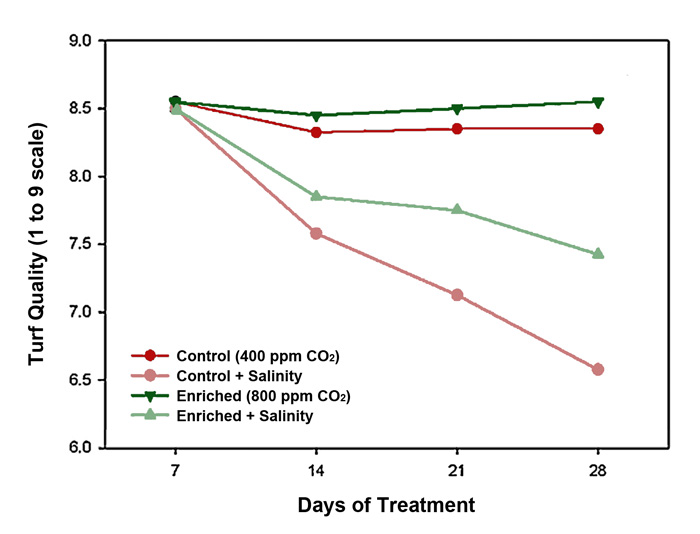| Tweet | Follow @co2science |
Paper Reviewed
Yu, J., Sun, L., Fan, N., Yang, Z. and Huang, B. 2015. Physiological factors involved in positive effects of elevated carbon dioxide concentration on Bermudagrass tolerance to salinity stress. Environmental and Experimental Botany 115: 20-27.
In a greenhouse study conducted at Nanjing Agricultural University in Jiangsu province, China, stolons of Bermudagrass (cv. 'Tifway') were transplanted into pots that were filled with sand and maintained at average day/night temperatures and natural light to establish canopy and roots for two months (August and September, 2013), during which time they were irrigated weekly with half-strength Hoagland's solution and trimmed to maintain a normal canopy height of 5-6 cm, after which they were moved to growth chambers with temperatures set at 35/30°C (day/night), 70% relative humidity and photosynthetically-active radiation of 650 µmol/m2/sec throughout alternating 12-hour periods of light and darkness, while during the final 28 days of the study, they were supplied with either fresh water or subjected to a salinity stress produced by irrigating the plants with a 200 mM NaCl solution, all the while being maintained in atmospheres of either ambient (400 ppm) or enriched (800 ppm) CO2 concentration.
This effort revealed, in the words of the five scientists, that the salinity stress in ambient air "caused reduction in turf quality, leaf relative water content, leaf net photosynthetic rate, transpiration rate, stomatal conductance, and cellular membrane stability." In the CO2-enriched treatment, on the other hand, they report that the elevated CO2 concentration alleviated the salinity-induced depression of those physiological parameters and "promoted osmotic adjustment through accumulation of soluble sugars, proline, and glycine betaine under salinity stress" (see, for example the graphic below for turf quality).

Effects of CO2 concentration on turf quality of Bermudagrass under non-salinity and salinity conditions. Adapted from Yu et al. (2015).
The bottom line of Yu et al.'s endeavor, therefore, boiled down to the simple fact, as they put it, that the "elevated CO2 concentration was effective in alleviating physiological damages of salinity stress in Bermudagrass," which further suggests, as they conclude, that "C4 grasses may benefit from the rising atmospheric CO2 concentration associated with global climate changes."
Posted 30 July 2015



